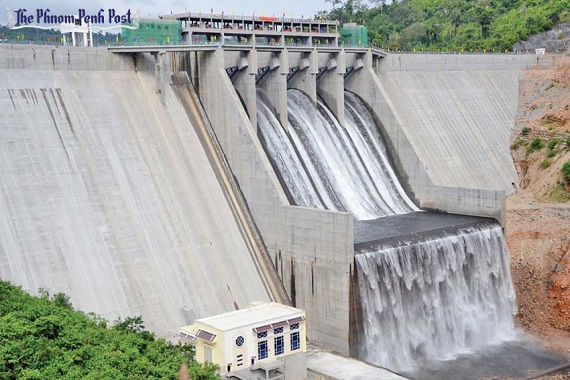Study faults contracts for dams’ negative impacts

Subpar project contracts may be to blame for the destruction of livelihoods and changes to ecosystems caused by foreign-run hydropower dams, a new report in the peer-reviewed journal Water has determined.
In a study of the Kamchay dam in Kampot province, operated by the Chinese firm Sinohydro, researchers from the London-based School of Oriental and African Studies (SOAS) found that industries relied upon by local populations, such as bamboo collection and tourism, had been significantly harmed by the dam.
“Villagers reported they are only able to collect a low quantity of bamboo since the dam was built. This is because the old bamboo area has been flooded and the new bamboo area is far away and difficult to access,” the paper reads. “The only livelihood alternative for the bamboo collectors is to work as construction workers; however the income they can get is not enough to support their family needs.”
Guiseppina Siciliano, the study’s main author, maintains that damage to local ecosystems occurs when it’s unclear who should take responsibility for mitigating a dam’s impact – a flaw inherent in the build-operate-transfer (BOT) contracts favoured in Cambodia, which effectively assign companies oversight of themselves. Altering contracts could prevent international companies from flouting local environmental protection laws, she said.
“BOT contracts are more common where there isn’t local expertise capable of running a dam, and these are the most common in Cambodia,” Siciliano said. “This makes it very difficult to define who is responsible, and the way the company communicates with the government is not very clear.”
Instead, countries like Ghana hire foreign firms to run hydropower projects using engineering procurement and construction (EPC) contracts, Siciliano said. This allows the government to have more oversight.
“Things were done better in Ghana, the government was involved and international standards were met,” she said.
In the case of the Kamchay dam, for example, Sinohydro violated Cambodia’s environmental impact assessment law by failing to complete an assessment of the dam until seven months after the project was completed, Siciliano noted.
Meanwhile, advocates say that Cambodia’s government and hydropower companies should communicate more closely with local residents.
“Right now, their assessments aren’t open to local communities, and sometimes they don’t even do them,” said Mory Sar of the Cambodian Youth Network, which educates young people on the impact of dams. “The consultation process isn’t open and the voices of the people are ignored.”
Un Chakrey, of the World Wildlife Foundation, agreed.
“We propose building smaller dams that would have a minor impact on the river and only produce a little less electricity,” he said. “But no one listens.”
Source: Phnom Penh Post

